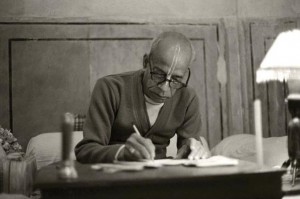Cows and Land
Fri. Dec. 7, 2012 Srimad Bhagavatam Class Discussion on Srila Prabhupada’s Letter of June 14, 1968 to Hayagriva concerning the future New Vrindavan.
This letter can be read here:
compiled by Lilasuka dasi
Comments made:
What stood out for one person is that the Brijbasis shouldn’t have to search for work outside.
One newer devotee asked how would it be possible to ever get to the level of austerity where the Brijbasis were in the ‘70’s, i.e. taking cold showers with a bucket over the head? How can one live like this?
One reply was that in the old days, we didn’t even have facilities like cars, running to town, hot showers, etc. so there was often no choice, but today since we have so many luxuries, the question is how to bring the 2 lifestyles together so it works for our spiritual advancement?
S.P. emphasized working the land. He said “They completely depend on nature’s beauty and nature’s protection.” And some devotees have experienced the value of working with the dirt. They find it very grounding. That contact with the land is essential.
The goal is not so much when will we start taking bucket baths again but how can we cut down little by little on the luxuries we enjoy and live as S.P. wanted, namely “It may be an ideal village where the residents will have plain living and high thinking.”
Another main point that stood out was Krishna’s main business in the vaisya town of Vrindavana was cow protection.
“Yukta vairagya” would be a good motto for N.V., which according to S.P.’s definition in this letter is: “In Vaisnava philosophy we have Yukta Vairagya, which means that we should simply accept the bare necessities of our material part of life, and try to save time for spiritual advancement.” Though S.P. did give another definition of yukta vairagya somewhere else a bit different.
How to reach this goal of living off the land in simplicity: suggestion: just 1 day a week offer bhoga only grown in the dhama.
In the SB 1.17.3, the importance of raising cows and bulls. Not only do we get milk, but we derive religious principles from dairy. In 1.17.3 it also says that all of society’s problems are because of misuse of the cow, as in most current commercial dairies. Hormones and other carcinogens are added to the milk, making it unofferable. So with these dairy products we do NOT “derive religious principles.” And the bull/ox is as important as the cow.
When baby bulls are born, they will just be idle like unwanted progeny unless we utilize them to work the fields.
How can we implement this cow protection as a lifestyle, including grinding grains, hand weaving cloth, using cow dung as fuel. S.P. said in the letter, “If there is sufficient grains and production of milk, then the whole economic problem is solved.”
If people come here and see us actually growing food, including individual householders, who are donating veggies regularly to temple, these visitors could see real Vrindavan village life. The pilgrims love helping with these things too.
There used to be several villages in NV: Madhuban, Vrindaban, Bahulaban.
Sivarama Swami’s village in Hungary was cited often BUT he himself told Soma that he was originally inspired by New Vrindavan, in the old, more self-sufficient days.
We could do things together on the land. For ex, in the old days, for some time, ½ before lunch was spent with all the devotees going out and harvesting a veg before they had lunch. They got a lot done this way. They used to often have poke weed veg, a delicacy that everyone liked.
The kids at our school used to help harvest potatoes at Ranaka’s big field.
Picking veggies together helps bring people together. What we grow and donate to the temple needs to be based on what is nutritious for devotees.
SP said: “You do not require any machines, cinema, hotels, slaughterhouses, etc.” but someone pointed out that we can use machines and build hotels as long as we don’t get attached to them and if they don’t take away from employing people, and if we use them to further the goal of bringing people closer to Krishna. For ex, SP said that as soon as we got electricity he would come here. (not sure of the exact quote).
NV today is quite spread out and not integrated enough.
It’s OK that different people are doing different projects but there must be communication between groups. This way, visitors will also see how we can work together.
Concept of “mamaka”=this is mine. But NOT “this is mine” to enjoy. Rather the land I have is mine to take care of and to work and use in K’s service.
Cow protection means not only milk but work from the oxen/bulls, cow dung as fuel, cow urine for medicines, etc.
END OF CLASS



